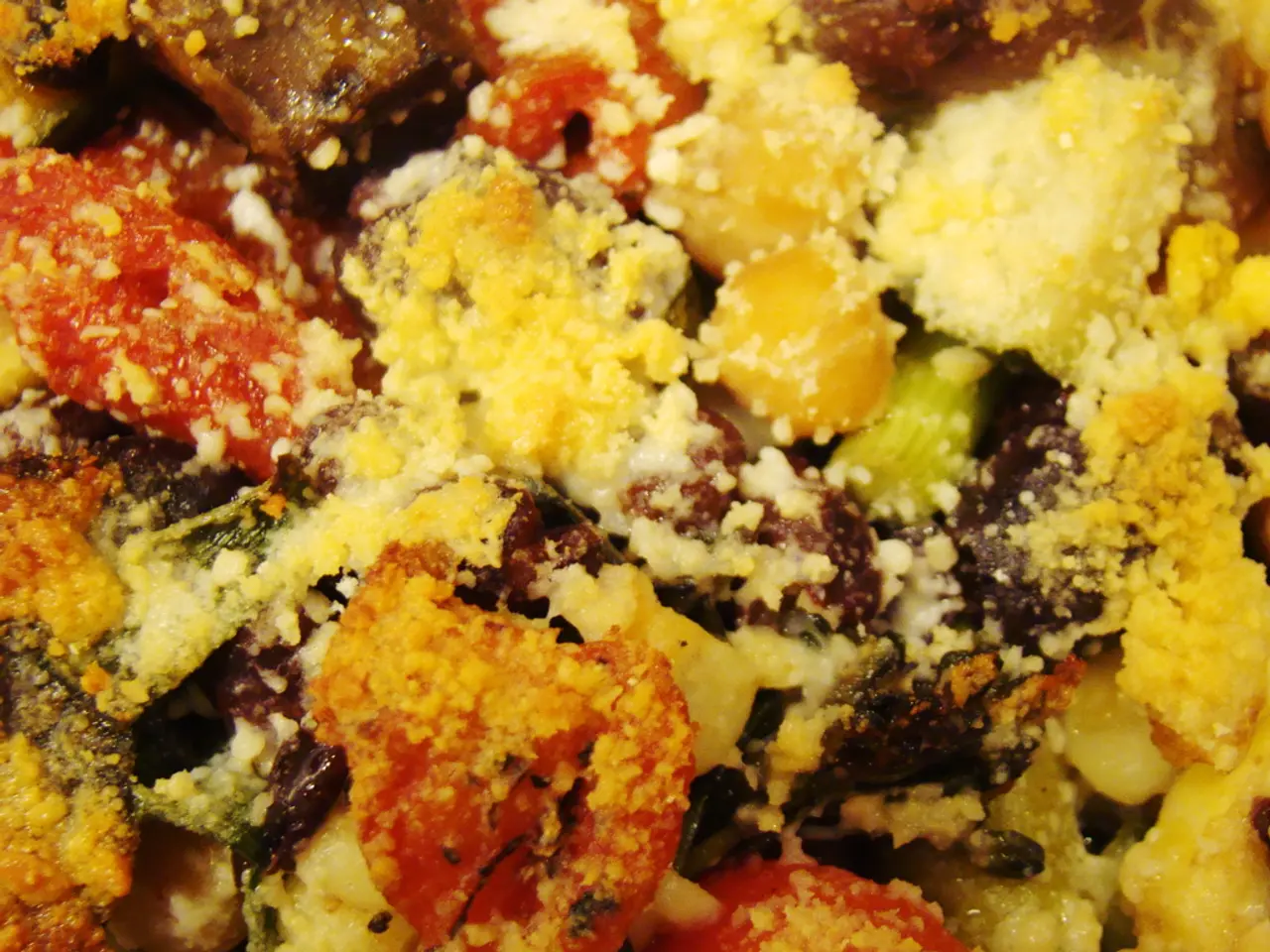Science-backed 7-day dietary guidelines for males and females promoting good health
In today's fast-paced world, maintaining a healthy diet can often feel like a daunting task. However, a new 7-day meal plan is here to help adults make informed choices and enjoy nutritious meals. This plan draws inspiration from four diets: plant-based, gut microbiome-supporting, Mediterranean, and vegetarian, creating a holistic approach to health, sustainability, and cultural relevance.
The meal plan is designed around key guidelines that emphasise nutrient adequacy, environmental impact, and cultural acceptability. It encourages the consumption of a variety of nutrient-dense foods, such as vegetables, fruits, whole grains, legumes, nuts, and seeds, to ensure essential nutrient intake and prevent deficiencies. Healthy fats, like polyunsaturated and monounsaturated fats, are prioritised, while saturated and trans fats are limited.
The meals also focus on plant-based protein sources and reduce or avoid processed meats. Added sugars, sugary beverages, and highly processed foods are minimised, as they contribute to weight gain and poor health outcomes. Salt intake is monitored, mainly from processed foods, to manage hypertension and cardiovascular risk. Water is primarily consumed, with milk, juices, and artificially sweetened drinks enjoyed in moderation.
The meal plan is adaptable to cultural and economic contexts, improving accessibility and effectiveness across diverse populations. It also encourages physical activity and maintaining a healthy body weight alongside dietary practices. This approach goes beyond just nutrition, incorporating environmental sustainability and cultural factors for comprehensive, practical meal planning.
Let's take a closer look at the meal plan:
Day 1 Lunch: A tuna salad sandwich on whole grain bread, an apple, and a handful of walnuts. Day 1 Dinner: A medium baked potato, 100g chili, 28g creme fraiche, a portion of leafy greens, three squares of dark chocolate with a handful of walnuts. Day 2 Lunch: Sardines in tomato sauce on two slices of whole grain toast. Day 3 Lunch: A portion of slow cooker black bean soup, roasted beets with almond cream cheese, grated carrot, and watercress. Day 4 Lunch: A medium baked potato, 100g chili, 28g creme fraiche, side of green beans. Day 5 Lunch: Sardines drizzled with olive oil on two slices of whole-grain toast with spread, leafy side salad. Day 6 Lunch: Seared sesame tuna bowl with julienned carrots, snow peas, pak choi, and bamboo shoots. Day 7 Lunch: A tuna salad sandwich on whole grain bread, sliced bell peppers, sugar snap peas, a pear, 28g walnuts.
The meal plan also includes snacks: Morning Snack on Day 7: One quarter cup Brazil nuts and a banana. Afternoon Snack on Day 7: A slice of spinach & tomato frittata and one serving of green olives, kombucha drink.
Dinner on Day 7 is slow cooker sweet potato curry served with one cup of cauliflower rice, one wheat paratha, a satsuma.
The meal plan contains a range of ingredients, some of which may be more expensive or more specialist depending on where a person lives and the outlets available to them. It is more cost-effective to buy ingredients in bulk and use them for meals throughout the week.
This meal plan can help someone maintain a healthful diet, plan their shopping, preparation, and cooking, and avoid buying and eating unhealthful foods on impulse. By following these principles, individuals can make informed choices, enjoy nutritious meals, and take a significant step towards a healthier lifestyle.
The meal plan incorporates a predictive approach, using science to ensure nutritional adequacy and prevent deficiencies, while considering factors like environmental impact and cultural acceptability in meal planning. The plan's snacks, such as Brazil nuts and spinach & tomato frittata, are mindfully chosen to support health-and-wellness, including mental health, as a lack of nutrients like omega-3 fatty acids can potentially lead to depression.
The meal plan promotes fitness-and-exercise by encouraging physical activity alongside dietary practices, emphasizing the importance of a holistic approach to health. Aside from the nutritional benefits, the meal plan also focuses on reducing the consumption of processed foods, like processed meats, sugary beverages, and artificially sweetened drinks, as these contribute to negative health outcomes, beyond weight gain.
By adhering to the meal plan and its key guidelines, people can make informed choices that prioritize their health and well-being. The meal plan, with the inclusion of snacks like kombucha drink, works synergistically with the concepts of science, health, and wellness, providing a roadmap for individuals striving for a healthier lifestyle.
The meal plan's adaptability to cultural and economic contexts ensures accessibility and effectiveness across diverse populations, addressing the needs and preferences of various communities, while still prioritizing their overall well-being and nutrition.






